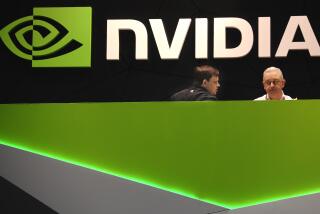Strong Clone Sales Boost Chip Maker’s Stock : Computers: Advanced Micro Devices is doing much better than analysts predicted with its version of Intel microprocessor.
- Share via
SAN FRANCISCO — After years of absorbing most of the blows in its bitter fight with Intel Corp., Advanced Micro Devices is finally getting its revenge.
The Sunnyvale-based computer chip maker has shaken off a long malaise on the strength of unexpectedly brisk sales of its clone of Intel’s popular 386 microprocessor. AMD’s stock soared Thursday in the wake of its announcement late Wednesday that it will sell about 2 million of its 386 chips by year-end and has strong bookings for next year.
AMD said it will have more than $120 million in revenue from the 386 in the fourth quarter--five times more than it had anticipated--and could garner as much as $600 million in sales from the chip next year. AMD may now be winning as much as 30% of all new orders for 386 chips, far higher than the 5% to 10% that most analysts had expected it to get.
Intel, meanwhile, appears to have seriously underestimated the potential impact of the AMD 386 line, introduced last March even as the companies remained locked in a bitter legal wrangle over rights to the technology. While AMD shares rose $1.75 per share to close at $16.75 on Thursday, Intel plunged $2.375 per share to finish at $42.50.
Intel did get a bit of a boost Thursday when a federal judge dismissed a portion of a $2-billion antitrust suit that AMD had filed against Intel earlier this year. The judge ruled that the statute of limitations had expired on AMD’s breach-of-contract claims relating to a 1984 technology-sharing agreement between the two companies, though another set of antitrust allegations remains alive.
For the moment, though, legal issues are in the background as personal computer vendors snap up AMD chips despite Intel’s ongoing campaign to persuade PC companies and customers that only Intel provides the real thing.
“There’s absolutely nothing wrong with the AMD chips,” said Mike Morand, vice president of marketing at AST Research, which is using an AMD 386 in one of its notebook computers. “We’re happy to see competition in the marketplace.”
AMD offers variations of the 386, some of which boast higher speeds and consume less power than Intel 386 chips. Morand noted that Intel had experienced some delays in shipping a chip especially designed for notebooks, so AST decided to go with the available AMD part.
David House, head of Intel’s microprocessor group, maintained that it still remains to be seen whether PCs incorporating AMD chips will prove popular with computer customers. He also said a rapid transition is under way to the more advanced 486 chip, on which Intel has a monopoly.






